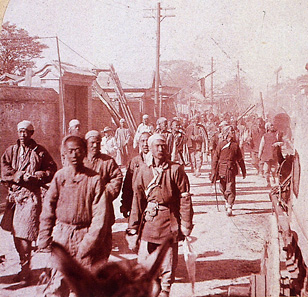Boxer Rebellion was an uprising in northern China in 1900 in which hundreds of Chinese and more than 200 people from other countries were killed. The Boxer Rebellion climaxed a movement in the late 1800’s against the spread of Western and Japanese influence in China.

The movement was started by a secret Chinese society called Yihequan (Righteous and Harmonious Fists), which originated in Shandong Province. This society was originally connected with the White Lotus sect, which opposed the Manchus, the rulers of China. Westerners nicknamed members of the group Boxers, because they practiced gymnastics and calisthenics. In the 1890’s, after the German seizure of a colony in Shandong, the Boxers began to oppose the spread of foreign influence in China. Many other Chinese shared these anti-Western feelings, and even the Manchus secretly approved of the movement.
In 1900, the Boxers set out to destroy everything they considered foreign. They killed Chinese Christians and supporters of Western ideas. They burned houses, schools, and churches. At first, they left missionaries and other foreigners relatively undisturbed.
In mid-June, the Boxers forced back foreign troops on their way to protect foreign diplomats in Beijing. Foreign troops seized several coastal forts that defended access to Beijing. Boxers and government troops besieged the legations (official residences of foreign diplomats) in Beijing from June 21 to August 14. Foreign guards, civilians, and Chinese Christians resisted. Boxers attacked missionaries and other foreign civilians in some parts of the countryside. Finally, a rescue force from eight nations crushed the uprising.
On Sept. 7, 1901, the Manchu government and representatives of 11 other nations signed a final settlement, called the Boxer Protocol. China agreed to execute several officials and punish many others, destroy many forts, and pay about $330 million in damages. In 1908, the United States returned part of the money it had received, to be used for educational purposes. The United Kingdom and Japan later did the same.
